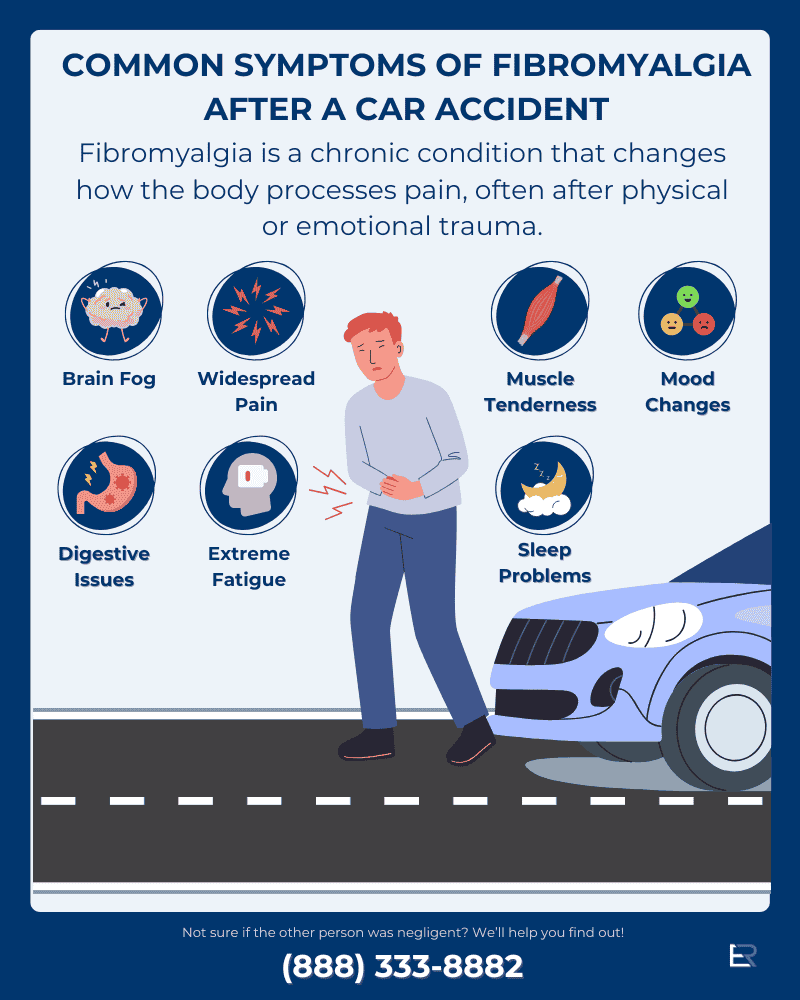Not all injuries from a car accident are easy to see. If you continue to experience pain weeks or months after your accident, you are not alone. Some people develop lasting pain, fatigue, and brain fog after an accident, signs that could point to fibromyalgia. New or worsening symptoms after a crash could point to a hidden injury, and you may have the right to seek compensation.
What Is Fibromyalgia?

Fibromyalgia is a chronic condition that affects how your body processes pain signals. It often leads to widespread musculoskeletal pain and other symptoms like extreme fatigue, sleep disturbance, and difficulty concentrating, sometimes called “fibro fog.” This condition can impact your entire body, making everyday tasks exhausting and overwhelming.
Researchers believe fibromyalgia develops when the brain and spinal cord become overly sensitive to pain. This heightened sensitivity causes the body to feel pain more intensely and for longer periods, even when there’s no clear cause. Many people who live with fibromyalgia also experience conditions like anxiety, depression, irritable bowel syndrome, or tension headaches.
How a Car Accident Can Trigger Fibromyalgia
After a car accident, you may suffer soft tissue injuries, whiplash, or other damage that seems minor at first. But for some people, these injuries don’t fade, they evolve into something more serious. If your pain begins to spread, or if you start feeling constant fatigue, poor sleep, or mental cloudiness, it could be a sign of fibromyalgia after a car accident.
Medical studies show that physical trauma can increase your risk of developing fibromyalgia, especially if you already have a history of stress, anxiety, or previous injuries. For many crash victims, the accident acts as a trigger, pushing the nervous system into a state where it can no longer properly manage pain. If this sounds familiar, it’s important to speak with a doctor and consider contacting a car accident attorney who understands how fibromyalgia can be tied to personal injury claims.
Common Symptoms of Fibromyalgia After a Car Accident
If you’re feeling worse instead of better after a car accident, it’s important to pay attention to the signs. Fibromyalgia can cause a wide range of symptoms that affect your body and mind. These problems may appear immediately or develop gradually, making it challenging to connect them directly to the crash. Knowing what to look for can help you get the right care and protect your legal rights.
Fibromyalgia symptoms include:
- Widespread pain that doesn’t go away
- Extreme tiredness, even after sleep
- Trouble with focus or difficulty concentrating
- Muscle or soft tissue tenderness
- Mood changes or feeling overwhelmed
- Sleep disturbance
- Digestive issues or irritable bowel symptoms
If you’re noticing these problems and they started after a crash, talk to a doctor and a car accident attorney right away.

Proving That a Car Accident Caused Your Fibromyalgia
Insurance companies don’t make it easy to prove fibromyalgia. They might argue that your pain isn’t genuine or claim that your condition was present before the accident. However, your injuries are legitimate and warrant serious consideration.
To help you prove your claim, our legal team:
- Reviews your medical records and treatment history
- Works with doctors who specialize in fibromyalgia
- Gathers expert testimony showing the link between the crash and your symptoms
- Shows how your life has changed since the accident
The earlier we start documenting your symptoms and care, the stronger your case will be.
What to Expect With Treatment for Fibromyalgia
Fibromyalgia has no cure, but there are several ways to manage fibromyalgia. The right treatment can improve both how you feel and how well you live your daily life. Unfortunately, the cost of care can build up, especially if your symptoms make it hard to work.
Common treatment approaches for fibromyalgia include:
- Medications for Pain and Sleep:
Certain prescriptions can reduce pain signals and improve sleep quality, helping your body rest and recover more effectively.
- Gentle Physical Therapy and Stretching:
Low-impact movement can ease stiffness, improve flexibility, and reduce pain over time without putting too much stress on sore muscles.
- Mental Health Support (Counseling or CBT):
Therapy can help manage stress, anxiety, or depression that often comes with chronic pain. CBT also teaches strategies to cope with pain more effectively.
- Diet and Lifestyle Changes:
Improving sleep habits, reducing processed foods, staying active, and managing stress can lower flare-ups and improve overall energy.
- Support Groups or Chronic Pain Clinics:
Connecting with others who understand your experience can provide emotional relief, practical tips, and access to specialized care plans.
How Our Legal Team Fights for Fibromyalgia Crash Victims
At El Dabe Ritter Trial Lawyers, we understand how frustrating it can be when no one seems to believe your pain. If you’re dealing with fibromyalgia after trauma from a car accident, we can help you get the medical care and legal support you deserve.
When you choose to work with us, we begin by thoroughly investigating your accident and documenting your injuries in detail. We’ll connect you with experienced medical professionals who understand how to diagnose and treat fibromyalgia. While you focus on healing, our team will manage all communication with the insurance company. From start to finish, we fight to secure full compensation for your pain, medical treatment, and lost income.
We take your case seriously because your suffering is real, and you deserve justice.
Let Our Car Accident Attorneys Fight for the Care and Compensation You Deserve

At El Dabe Ritter Trial Lawyers, we know the lasting impact a crash can have on your health, your family, and your future. With over 20 years of experience helping injured Californians, we are ready to fight for the compensation and justice you deserve. If you’re living with the pain and challenges of fibromyalgia after a car accident, you deserve support. Don’t wait to get the help you need!
Contact us today for a free consultation and learn how we can help you regain control of your health and future.
Disclaimer: The information provided in this blog post is not intended as legal advice and should not be relied upon as such. You should consult with an experienced attorney for advice on your specific situation.
